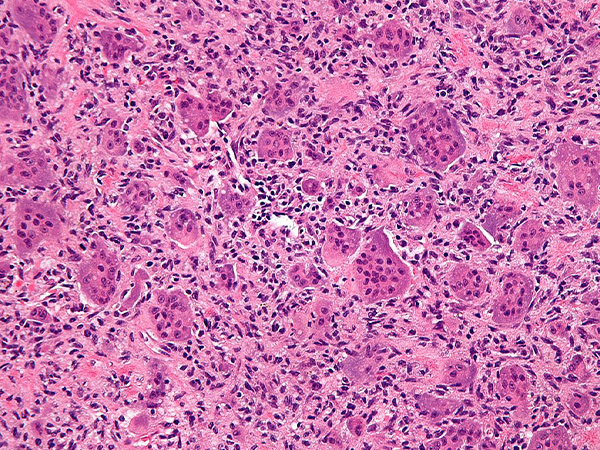Targeting a Group of Rare Tumors
The molecularly targeted therapeutic pexidartinib is the first ever systemic treatment approved by the FDA for the treatment of tenosynovial giant cell tumors.

The U.S. Food and Drug Administration (FDA) recently approved a new molecularly targeted therapeutic called pexidartinib (Turalio) for treating adults who have a tenosynovial giant cell tumor that is causing them severe morbidity or functional limitations and is not amenable to surgery.
With this decision, pexidartinb became the first systemic treatment approved specifically for treating tenosynovial giant cell tumors. Tenosynovial giant cell tumors are a group of rare tumors that arise in and around the joints and tendons. Although these tumors are benign, they cause damage to the joints, which leads to pain, swelling, and limitation of movement of the joint.
Surgery is the main treatment option for patients diagnosed with a tenosynovial giant cell tumor. If patients do not have surgery or if the tumor continually recurs, patients suffer damage and degeneration of the affected joint and surrounding tissues or structures. In some cases, this can cause significant disability.
Some cells in tenosynovial giant cell tumors have been shown to harbor chromosomal translocations that lead to overproduction of a protein called CSF1, which attracts large numbers of immune cells. The immune cells that accumulate form the bulk of the tumor and cause damage to surrounding tissue.
Pexidartinib targets the protein that CSF1 attaches to on the surface of immune cells, CSF1R, preventing CSF1 from attaching and recruiting the immune cells to the tumor.
Pexidartinib was approved for treating tenosynovial giant cell tumors after it was shown in a randomized phase III clinical trial that 38 percent of patients who received the molecularly targeted therapeutic had complete or partial tumor shrinkage compared with none of the patients who received placebo.
The clinical trial data, which were published recently in Lancet Oncology, also showed that seven patients discontinued pexidartinib because of liver-related adverse effects. As a result, the FDA has mandated that the prescribing information for pexidartinib includes a Boxed Warning about the risk of serious and potentially fatal liver injury and that pexidartinib only be available through a risk evaluation and mitigation strategy program, which requires that health care providers using pexidartinib be specially certified.
